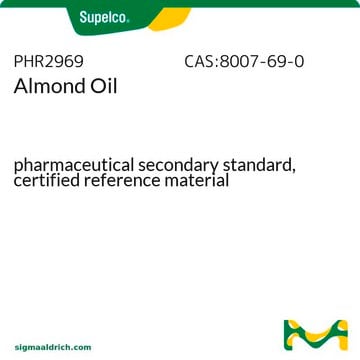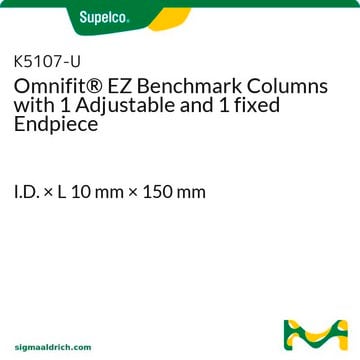63445
Almond oil from Prunus dulcis
tested according to Ph. Eur.
Synonym(s):
Amygdalae oleum raffinatum, Almond oil, sweet
Sign Into View Organizational & Contract Pricing
All Photos(1)
About This Item
Recommended Products
Agency
USP/NF
tested according to Ph. Eur.
Quality Level
density
0.91 g/mL at 20 °C
application(s)
pharmaceutical (small molecule)
storage temp.
2-8°C
Looking for similar products? Visit Product Comparison Guide
Storage Class Code
10 - Combustible liquids
WGK
WGK 2
Flash Point(F)
Not applicable
Flash Point(C)
Not applicable
Personal Protective Equipment
dust mask type N95 (US), Eyeshields, Gloves
Choose from one of the most recent versions:
Already Own This Product?
Find documentation for the products that you have recently purchased in the Document Library.
Customers Also Viewed
Hossein Saidi et al.
Human & experimental toxicology, 31(5), 518-522 (2011-04-22)
Aluminum phosphide (ALP), as an effective pesticide and a substance used for protecting rice during storage, has become one of the commonest causes of poisoning and even suicide in developing countries including Iran and India. The authors aimed to study
Natália Mezzomo et al.
Bioresource technology, 101(14), 5622-5632 (2010-03-06)
Peach kernels are industrial residues from the peach processing, contain oil with important therapeutic properties and attractive nutritional aspects because of the high concentration of oleic and linoleic acids. The extraction method used to obtain natural compounds from raw matter
Ammar Cherif et al.
Comptes rendus biologies, 332(12), 1069-1077 (2009-11-26)
The evolution of the composition of sterols and squalene during the maturation of the fruit of three cultivars (Achaak, Perlees and Mazetto) almond (Prunus amygdalus Batsh) was investigated. At the same time the evolution of oleic, linoleic and linolenic fatty
Gianpiera Spada et al.
Carbohydrate polymers, 92(1), 40-47 (2012-12-12)
Two water in oil emulsions composed by eudermic ingredients as glycerin, cocoa butter, almond oil and a variety of lipids, were enriched respectively with milk thistle dry extract (MT) or with a binary complex composed by MT and hydroxypropyl-β-cyclodextrin (HP)
P Ferraro et al.
Nature nanotechnology, 5(6), 429-435 (2010-05-11)
Manipulating and dispensing liquids on the micrometre- and nanoscale is important in biotechnology and combinatorial chemistry, and also for patterning inorganic, organic and biological inks. Several methods for dispensing liquids exist, but many require complicated electrodes and high-voltage circuits. Here
Our team of scientists has experience in all areas of research including Life Science, Material Science, Chemical Synthesis, Chromatography, Analytical and many others.
Contact Technical Service









